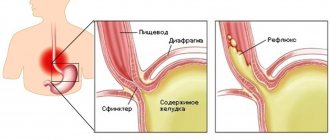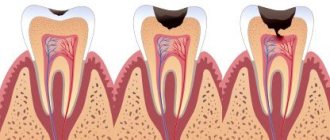An unpleasant odor emanating from the oral cavity causes psychological discomfort, reduces self-esteem, and can signal various pathologies in the body, systemic diseases, and physiological disruptions in the functioning of internal organs.
The reason does not always lie in insufficient hygiene or dental diseases. The smell of ammonia from the mouth in adults may indicate problems in the functioning of the digestive tract, impaired functioning of the kidneys, liver, as well as the presence of other health problems in a person.
Main nuances
“Bad breath is scientifically called “halitosis.” It can be physiological and pathological. In the first case, they usually talk about the “aroma” that appears in the morning and disappears after morning hygiene procedures. In the second case, the appearance of such a symptom has certain medical reasons,” says Evgenia Parshina. As the immunologist notes, smoking can, for example, influence the appearance of bad breath.
Among the main causes of halitosis is poor oral hygiene, when a person does not properly care for his teeth. It can also be caused by tooth decay or plaque on the tongue. The problem can also appear, as the immunologist notes, with chronic tonsillitis.
Question answer
Why does my breath smell bad in the morning? Also often the problem is caused by diseases of the gastrointestinal tract, for example a disease such as GERD (gastroesophageal reflux disease). Another reason could be the presence of Helicobacter pylori bacillus in the human body, says the immunologist.
Unpleasant odors from the mouth can be felt by a person suffering from diseases of the nasal cavity, which are accompanied by postnasal drip, as well as swelling of the mucous membranes and inflammation of the adenoids in children. “In children, by the way, an unpleasant smell from the nose can also appear against the background of foreign objects in the nose, which can remain in the nasal cavity for a long time,” says Evgenia Parshina.
general information
Olfactory hallucinations (phantosmia) are a condition in which a person perceives non-existent odors, which can be both pleasant and disgusting. As a rule, there is a tendency to feel unpleasant odors: burning, rotten fish, etc. Phantosmia may be constantly present or appear periodically and then disappear.
Along with olfactory hallucinations, there are parosmia - conditions in which the patient perceives a distorted odor from a real object. For example, some patients after Covid complain of smells of “rot” or “carrion” from quality products. The patients’ relatives do not feel anything like that, but “hear” the aroma that should normally come from the dish.
Diabetes
For example, Evgenia Parshina notes that with diabetes, a person can smell a fruity or apple aroma from himself. A similar manifestation is observed when following, for example, a keto diet. The smell of diabetes is quite characteristic, it is similar to the aroma of soaked, fermented apples and resembles acetone. In people suffering from diabetes, there is a sharp increase in blood glucose levels, and ketone bodies begin to be released. Under starvation conditions, cells begin to actively use fats and proteins, including those stored for future use by the body, and when they break down, acetone begins to appear.
Symptoms and diagnosis of ammonia odor
A symptom such as bad breath often occurs suddenly. The person feels serious discomfort. To recognize the disease at home, you need to put a cotton swab under your tongue for a second, then take it out and smell it. There are special diagnostics at the dentist, which is carried out using modern equipment. If necessary, ultrasound, x-rays, tests, and tomography are prescribed. The disease may be indicated by:
- Nausea, weakness, vomiting, impaired urination, fainting.
- Abdominal pain, dry mouth, thirst appear with diabetes. In this condition, you should call an ambulance.
- High excitability, irritability, anxiety, and poor concentration may occur. The patient's heart will work intermittently, and sweating will increase.
Kidney problems
“Another chronic disease that can lead to the appearance of an unusual odor is kidney failure,” says Evgenia Parshina. Thus, with diseases of the urinary system, for example nephrosis, pyelonephritis, etc., manifestations of the smell of ammonia may be observed. Usually this kind of smell appears already in the terminal stage. The mechanism by which the odor appears is that the main source of ammonia is the catabolism of amino acids and the breakdown of other nitrogen-containing compounds in tissues, including the kidneys. An imbalance leads to the accumulation of a substance in the blood.
Salty taste. What diseases does this symptom indicate? More details
Why appearances
Keep in mind! Ammonia is produced in the body during the breakdown of proteins and fats.
In a healthy person, this natural process ends very quickly; toxic breakdown products are easily eliminated from the body.
The smell of ammonia from the mouth indicates problems in the functioning of individual organs that cannot cope with toxins.
If ammonia cannot leave the body through the genitourinary system, it exits through the lungs. This is why the smell of ammonia comes from your mouth.
At best, the cause of an unpleasant odor may be improper oral care ; at worst, it may be the appearance of pathology .
In most cases, bad breath occurs as a result of diseases of the teeth and gums. Much less often, the cause lies in the pathology of the internal organs.
Main reasons
For your information! There are several known reasons for the appearance of ammonia odor from the mouth:
- Poor nutrition. Poor diet is one of the reasons for the appearance of uncharacteristic odors from the mouth. When there is a lack of nutrients in the body, the process of active breakdown of stored fats begins to replenish energy. Excess protein in the menu disrupts the functioning of the kidneys and liver due to overload. Improper functioning of these organs makes it difficult to remove ammonia from the body naturally. Excessive consumption of foods enriched with proteins causes rapid breakdown of fats, which means increased formation of ketone bodies. The body, not accustomed to such a load, cannot remove ketones in a timely manner; they accumulate in the body, causing an unpleasant odor.
- Restrictions on drinking and eating. For normal functioning of the kidneys, a large amount of water is required, if it is not enough, it means that it is difficult to remove waste products through the kidneys. This leads to stale breath from the mouth. Hunger forces the body to process stored fats and proteins to replenish missing nutrients. As a result, the level of ketone bodies in the blood increases significantly.
- Liver diseases. Ammonia is filtered through the liver and eliminated from the body by the urinary system. When liver function is impaired, the filtration of ammonia compounds slows down, which provokes the accumulation of ketones in the blood plasma.
- Taking medications that contain amino acids and nitrogen. Such drugs include:
- ACTI-5 is prescribed to children with growth retardation and poor appetite.
- Biotredin is used to improve performance.
- Glycine is prescribed for frequent stress, vegetative-vascular dystonia, lack of sleep, and alcoholism.
- Methionine is used in the treatment of kidneys and diabetes.
- Moriamin Forte is prescribed during pregnancy and lactation.
- Diabetes. The main characteristic of this disease is high blood glucose levels. Tissues cannot cope with the absorption of glucose, so the required amount of useful elements does not reach the cells. To replenish the required amount of vitamins and minerals, fats begin to break down at an accelerated pace, thereby forming much more ketone bodies. Ketones, when accumulated in the blood, have a toxic effect on the body, which leads to the appearance of an ammonia odor from urine, skin and breath.
- Kidney diseases such as nephrosis, renal dystrophy, renal failure. This leads to serious disruptions in the functioning of the renal tubules, due to which normal metabolism occurs. Pathological changes lead to the accumulation of ketone bodies.
- Thyrotoxicosis is a disease of the endocrine system, namely the thyroid gland, in which the level of thyroid hormone increases. This hormone is responsible for metabolism; its increase leads to faster metabolism. An accelerated metabolism affects weight loss.
Hyperthyroidism
The smell of iodine from the mouth also indicates problems in the body. Usually, when such a signal appears, doctors send the person to be checked for problems with the thyroid gland, in particular hyperthyroidism. It is this gland that is associated with iodine. When the body has a problem with the production of hormones, it does not have enough capacity to work properly and dispose of everything unnecessary and excess, the accumulation of substances begins. Hence the smell. Also, sometimes the appearance of an iodine odor indicates problems from taking hormonal medications. And sometimes it appears during tooth decay as an oxidative reaction.
Question answer
How to eliminate the smell of onions and garlic?
Treatment
Drug therapy, regimen, course, and duration of treatment are selected individually in each specific case. The choice of treatment methods depends on the root cause, age, and general physiological condition of the person.
Patients may be prescribed:
- enzyme agents;
- symptomatic medications;
- immunomodulators;
- hepatoprotectors;
- antibacterial, antiparasitic complex drugs;
- diuretics, hormones;
- anti-inflammatory drugs.
If bad breath is caused by acute or chronic pathologies or diseases, much attention is paid to symptomatic therapy and complex treatment.
Aerosols that suppress the development of pathogenic flora and special antiseptic solutions will help:
- Stopagin. A complex drug with a pronounced antiparasitic and antibacterial effect. Prescribed for rinsing.
- Chlorhexidine. Has an aseptic, bactericidal effect. Used to treat pathologies of the urinary system.
- Hexoral. An effective remedy for the treatment of dental diseases.
If endocrine disorders are diagnosed, treatment therapy is carried out under the supervision of the attending physician. Drugs are prescribed to suppress the activity of the thyroid gland, normalize its functioning, and secretory activity. For thyrotoxicosis, radioactive iodine is used.
For renal diseases, drug therapy depends on the form and stage of the underlying disease. Diuretics, anti-inflammatory, and antibacterial agents with complex effects may be prescribed, the action of which is aimed at relieving the clinical symptoms of the disease.
If uremic stench is provoked by strict diets, prolonged fasting, unbalanced nutrition, the attending physician or nutritionist will adjust the diet and prescribe a special diet to normalize metabolic processes and water and electrolyte balance in the body.
Anemia
A metallic taste from the mouth indicates the development of anemia. It develops against the background of an increase in the concentration of metal ions in the body. With anemia, the transport of hemoglobin is impaired. It is also sometimes called iron. As a result, a complete imbalance of the human condition begins.
Naturally, such a problem should not be ignored: any manifestations of some foreign aroma should be determined by taking tests and consulting with a specialist. You can start with a therapist: he will be alert to a particular disease and will offer examination options, and then therapy. You cannot leave the situation to chance, hoping that it will go away on its own. After all, there is a risk of the pathological process turning into a chronic one: treating it, as we know, is much more difficult, longer and more expensive. And the result is unpredictable.
There are contraindications, you should consult your doctor
Other causes of urine odor from the mouth
Protein diets, prolonged fasting, monotonous, unbalanced nutrition, drinking a small amount of liquid per day often lead to disruption of water-salt and electrolyte balance. If a large amount of protein food enters the body, the load on the kidneys and liver increases significantly.
Medicines, protein complexes, and nutritional supplements can also cause bad breath. Especially if pharmacological preparations, mineral and vitamin complexes contain nitrogen-containing substances, amino acids, and proteins.
Abuse of alcohol, drugs, and bad habits lead to irreversible consequences in the body and provoke the development of various systemic pathologies and functional disorders.
A constantly emanating uremic aroma indicates a violation of biochemical processes in our body. Therefore, in order to eliminate and neutralize the stench, it is important to establish the root cause of ammonia “amber”.
The influence of phantosmia
Tastes and aromas have a huge impact on a person’s state and mood. Constant “stench” or even anticipation of an attack significantly reduces the quality of life and can provoke an increase in anxiety and the development of depression. The senses of smell and taste are closely linked, so people refuse food and lose weight, which adversely affects other functions of the body.
There are real dangers too. Inability to recognize the real smell due to olfactory hallucinations after Covid can lead to eating expired products or not responding to a gas leak in a timely manner. In professions that require the identification of odors, for example, working as a cook, sommelier or perfumer, phantosmia can cause disability.
Phantosmia due to coronavirus
Some time after the start of the pandemic, more and more reports began to appear about the loss of the sense of taste and smell during the period of illness. After some time, it turned out that the problem did not disappear with recovery. Experts began to study this phenomenon and found that phantosmia is part of the post-Covid syndrome.
Most often, the disturbance in the perception of tastes and aromas persists for several weeks. Some people experience this phenomenon even after 2 months. Many cases have been described in which all the symptoms disappeared, and then, after a period of imaginary well-being, reappeared. Researchers say parosmia can persist for up to six months or more.
The etiology of the symptom has not been definitively established. Neurologists believe that hallucinatory manifestations are due to the restoration of the nerve, citing an analogy with the situation when a person “rested” an arm or leg. Initially, there is no sensation in the limb.
Then nerve conduction begins to recover, which is accompanied by the crawling of non-existent goosebumps, and the person does not know how to get rid of the unpleasant sensations. And then everything returns to normal. So it is here. During the illness, the olfactory nerve was damaged, now its functions are normalized, and this is manifested by phantosmia, which will disappear after full recovery.
Otolaryngologists have a slightly different theory. They believe that the reason lies not in the nerve itself, but in its endings, which are located in the nasal mucosa and are responsible for the perception of odors. In support of their point of view, they cite observations according to which phantosmia is more often detected in people who previously suffered from chronic rhinitis and sinusitis. Damage by coronavirus aggravates previous pathological changes in the mucous membrane - odor hallucinations occur.
One way or another, experts agree on one thing - the unpleasant phenomenon is temporary. After a certain period, everything will be restored. But we shouldn’t let our guard down. If symptoms persist for a month or more, you should see a doctor.










